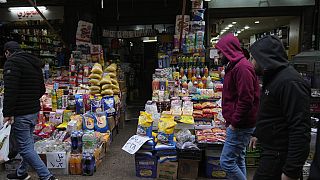Kenya
At Dandora dumpsite, waste stretches in all directions. This is where much of the garbage collected in Nairobi ends up. But one man's trash is another man's treasure.
This place is a way for many people to earn a living. Every morning, they flock to the dumpsite to sift through the garbage for anything worth selling.
Some collect plastics which can be sold on to recycling plants. But Steve Okoth is on the lookout for something else... e-waste. Discarded electronic devices and components can also be sold on. However, the job is not without risks.
"When the e-waste comes here, it contains some powder which affects my health. It affects my health in that when it is burnt it releases gases, which when they enter the body you can't come to work because of chest problems. But we have no option really. Some people's health is really bad, like mine. But we are now used to the smoke because if you don't go to work you will not eat," he says.
"If they stop it (e-waste) from coming here we will suffer to the extent that we won't even come to work because there is nothing and what you depended on has been removed. What will you do? They should know what to do with it but they should not stop these electronics from coming here."
62 million tonnes of e-waste were produced globally in 2022, according to a new report by the U.N. And it could rise to 82 million tonnes by 2023, says the UN’s fourth Global E-waste Monitor (GEM).
This represents a huge amount of precious resources that just end up in dumps. So recycling plants like Nairobi's WEEE center are trying to make a dent in that e-waste mountain.
"We use the circular economic principles of repair, refurbish, recycle, repurpose to manage electronic waste and make sure it does not end up in the environment because we know electronic waste has hazardous consequences and right now it is the fastest growing industry in the world," says Catherine Wasolia, COO of WEEE center.
The WEEE center has collection points across Kenya where people can deposit old electronics. "We take inventory of the items and if there are items which maybe have data, we will do the data wiping to make sure that your data is safe and then we are going to come and check and test it to see if it can be re-used or repurposed and things of that sort," explains Wasolia.
"If it cannot then it is disassembled into the different component parts. That will be your plastics, your metals and then the screws will be kept separately ,and the boards. So the boards usually we export it to our partners who are also using circular economic principles in Europe. And then the plastics and the metals, usually they are sold locally to other recyclers of those items."
Currently, only 1 percent of demand for rare earth elements is met through e-waste recycling.But the UN estimates that there were 91 billion US dollars worth of metals embedded in 2022's e-waste.
In African countries, less than 1 percent of e-waste is formally recycled.It will take a huge shift for those valuable resources to stay out of the dumps.













01:22
World will have to learn to live with heatwaves, UN says
01:39
Sustainable development financing conference opens in Seville
01:42
Gaza residents welcome rare organized aid delivery after months of chaos and hunger
01:50
UN urges renewed political and climate action in Libya amid humanitarian and governance crises
00:58
Cash crunch stalls UN probe into possible war crimes in DR Congo
01:37
South Africa calls for peaceful resolution to Israel-Iran conflict